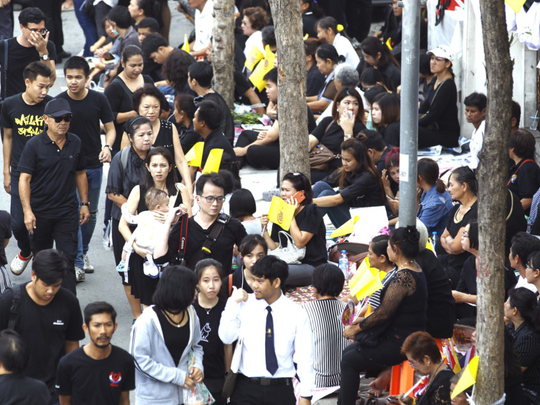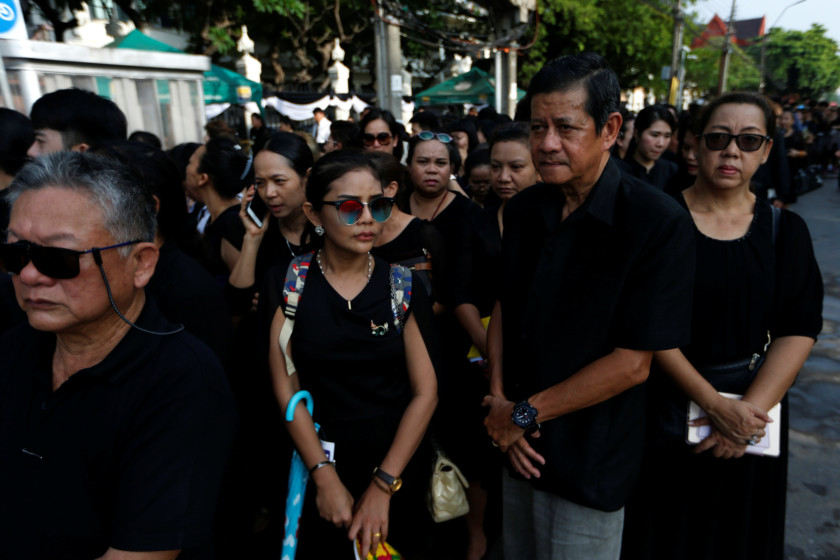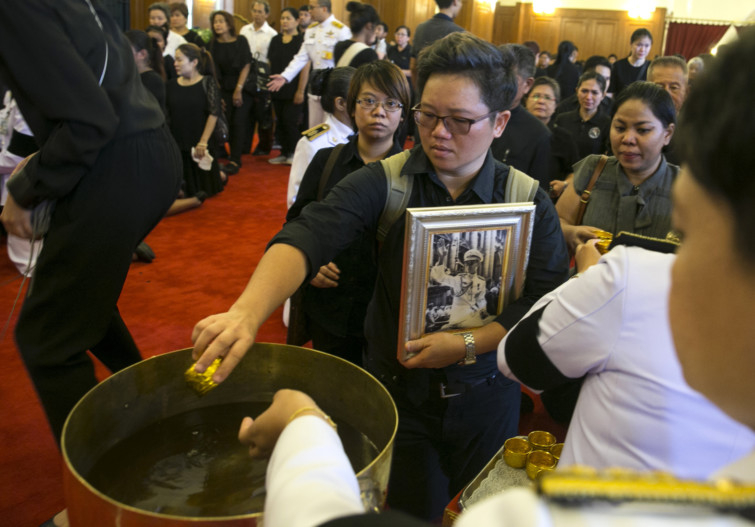
BANGKOK: Millions of Thais donned black Friday as the grieving nation prepared to hold traditional Buddhist ceremonies for revered King Bhumibol Adulyadej, whose death leaves the country facing an uncertain new era.
Bhumibol, the world’s longest-reigning monarch, passed away at 88 on Thursday after years of ill health, removing a stabilising father figure from a country where political tensions remain raw two years after a military coup.
Crown Prince Maha Vajiralongkorn, 64, is the king’s named successor, but has made a surprise request to delay formally becoming the next king, according to the junta leader, who appealed for citizens to accept the decision and “not cause chaos”.
The palace said a motorcade would transport the monarch’s body — followed by the crown prince and other members of the royal family — from the hospital where he died.
His remains will be taken to the nearby Grand Palace, a complex of glittering temples and pavilions in the heart of the capital, and large crowds are expected to pour onto the streets to pay their respects as the motorcade passes.
Thai community in UAE mourns death of King
The crown prince will then preside over the bathing of the king’s body, a traditional Buddhist funeral rite.
His remains are expected to lie in state for months of palace rituals, including at least 100 days of chanting by monks.
United in grief
A day after distraught Thais wept in Bangkok’s streets on learning of the death of the king, the capital of 12 million people projected a sombre calm. Many wore black and white, both mourning colours in Thailand.
Government offices and state-run enterprises were shut out of respect but otherwise businesses and financial markets opened as normal.
The stock exchange, which has been pressured all week as the king’s health worsened, opened 3.5 percent higher.
“I am very sad, I was born under this king,” Arunee Sahathongthai, 49, told AFP as she bought a pair of black trousers at a market in Bangkok, saying that Thais were “united in grief”.
Some said they were nervous about a future without Bhumibol.
“I really loved him,” said Arnon Sangwiman, a 54-year-old electricity company employee.
“Now I am afraid of what may happen, about the administration of the country, the type of regime in the long term.”
Thais had expected Vajiralongkorn to be officially proclaimed king immediately.
But Thailand’s junta leader Prayut Chan-O-Cha late Thursday announced the prince had sought a delay to mourn and prepare for the crown.
‘Element of ambiguity’
Most Thais have known no other monarch than Bhumibol and he was portrayed as a guiding light through decades of political turmoil and coups.
The crown prince, however, spends much of his time overseas and is yet to attain his father’s widespread popularity at home.
There was no indication of any threat to the expected succession and analysts said the pause could merely indicate a careful prince showing respect for his father.
“We maybe shouldn’t read too much into (the delay),” said David Streckfuss, an expert on the Thai monarchy.
“But we have already departed from what should have been a normal succession process. An element of ambiguity has been injected into the situation.”
Strict lese majeste laws muffle detailed discussion of the sensitive issue.
The junta overthrew the democratically elected government of Yingluck Shinawatra in 2014, saying it wanted to end a decade of political strife.
Yingluck’s brother, tycoon Thaksin Shinawatra, had previously been overthrown in a 2006 coup, and tensions have simmered between Thaksin supporters and a competing faction seen as aligned to the crown and military.
With the king ailing at the time, some analysts believe the takeover may have been prompted in part by concerns over an unstable succession in which Thaksin’s faction could seek to exert influence.
During Bhumibol’s reign, Thailand transformed from an impoverished, rural nation into one of the region’s most successful economies, avoiding the civil wars and communist takeovers of its neighbours.
He sometimes intervened to quell Thailand’s frequent political violence but also approved most of the army’s many coups during his reign.
Tributes have poured in from across the globe for the monarch, with President Barack Obama describing Bhumibol as a “close friend” of the United States and a “tireless champion” of his country’s development.
Thai king’s incredible popularity explained
Many Thais revered late king Bhumibol Adulyadej, who passed away at the age of 88 on Thursday, with near god-like devotion. Here’s why.
Q) Is his popularity among Thais comparable to how Europeans feel about their royal families?
A) The love is much more intense among Thais who undoubtedly felt a deep spiritual connection with their king. He was widely seen as a serene and caring father of their nation and a representation of their own best Buddhist values and beliefs. Most genuinely love him for what they see as his modesty, humility and life-long commitment to helping the poor.
In a near cult-like atmosphere, the king’s picture hangs in every taxi, office and shop. Before movies, cinema-goers stand in homage as images of him flash across the screen.
Q) Thai politics has seemed to be in a constant state of chaos during his seven-decade reign. Why is he not blamed?
A) While Bhumibol was monarch there were more than a dozen coups or attempted coups, and the kingdom is once again under military rule after generals ousted another democratically elected government in 2014.
Yet many Thais do not see their late king as a contributor to the turmoil, but rather a much-needed figure of authority and stability who yielded his power sparingly but decisively.
In one of his most famous interventions, Bhumibol in 1992 called then-prime minister General Suchinda Kraprayoon to his palace and humiliated him on television for ordering a bloody military crackdown on demonstrations against his government. The prime minister resigned.
But he did not intervene during some other political crises, and approved most of the successful coups during his reign.
Q) How did he actually help Thais, in tangible economic terms?
A) Many Thais believe the king devoted his life to helping the poor, and he sponsored thousands of royal projects aimed at alleviating poverty. Thais credit him with water-control projects that have stopped flooding in Bangkok, and pioneering cloud-seeding technologies that brought rain over drought-stricken farmlands. He is also hailed for helping to quell opium growing among hill tribes in the north of the country by introducing alternative farming opportunities.
Q) What do Thais love about him personally?
A) In his younger days, Bhumibol enjoyed a reputation for having that X-factor of coolness and charisma. He was heavily promoted as an accomplished jazz saxophonist, composer, photographer and yachtsman. Bhumibol once played the saxophone with jazz legend Benny Goodman and won a gold medal for sailing at the Southeast Asian Peninsula Games in 1967. In his later years he was seen as a sage, dispensing advice through parables about his favourite dog, an adopted stray. Books about his dog outsold bestsellers, such as Harry Potter, in Thailand.
Q) Was he really as talented, skilled, compassionate and virtuous as all this?
A) A relentless and powerful propaganda machine has burnished the king’s reputation. He also built a fortune for the monarchy worth tens of billions of dollars, while siding with the elites that have perpetuated their rule over the masses.
And although he famously said in 2005 that he was not above criticism, the law says otherwise. Thailand has lese majeste laws that carry penalties of up to 15 years for anyone who “defames, insults or threatens” the king.














